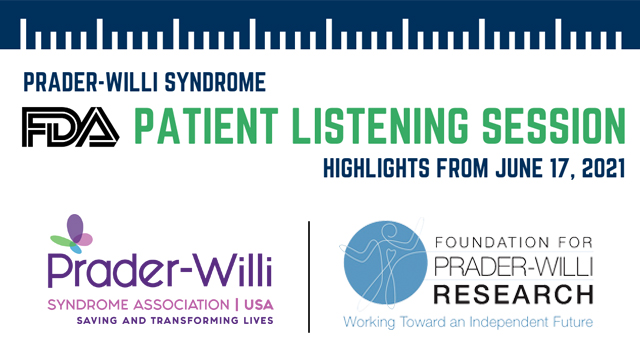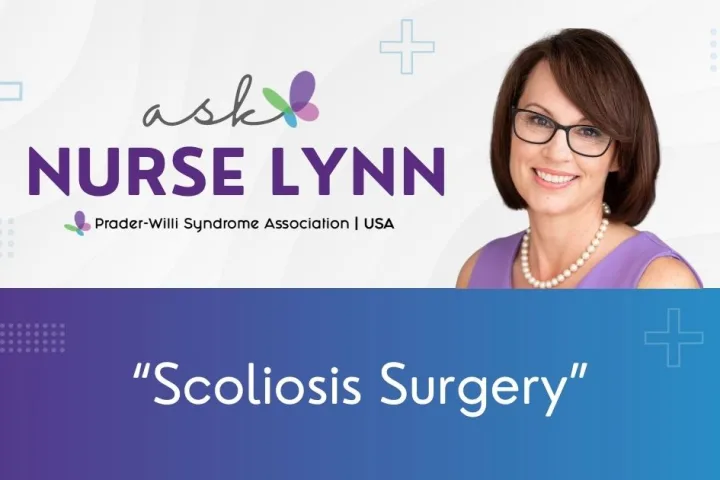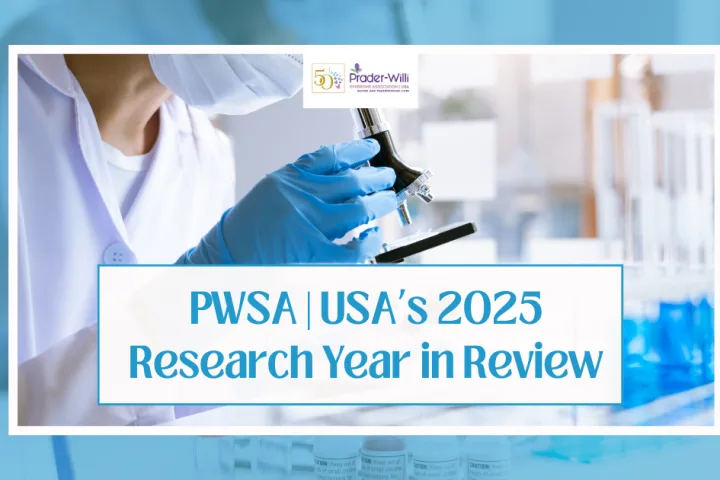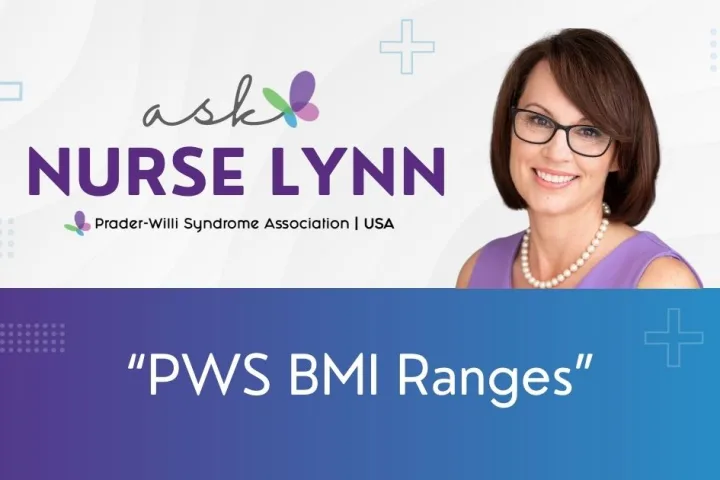On June 17, 2021, PWSA | USA and FPWR held a Patient Listening Session with the FDA to share our community’s experiences related to Prader-Willi syndrome (PWS). The purpose of this meeting was to promote dialogue between the FDA and members of the PWS patient community to ensure the FDA has a full understanding of the unique challenges of PWS and issues related to PWS clinical trials.
More than 60 FDA representatives attended the one-hour meeting along with representatives from PWSA | USA, FPWR, and advocates from the PWS research field:
- Theresa Strong*, Director Research Programs, FPWR, parent of an adult with PWS
- Rob Lutz*, Member Board of Directors, PWSA | USA, parent of an adult with PWS
- Elizabeth Dykens*, Professor, Vanderbilt University
- Paige Rivard, CEO, PWSA | USA, parent of a child with PWS
- John Walter, CEO, FPWR
- Susan Hedstrom, Executive Director, FPWR, parent of a child with PWS
- Lauren Schwartz-Roth, Clinical Psychologist, FPWR, parent of an adult with PWS
- Elizabeth Roof, Senior Research Specialist, Vanderbilt University
- Caroline Vrana-Diaz, FPWR, note taker
What is a Patient Listening Session?
Patient Listening Sessions allow patients, caregivers, and their advocates to share their experiences and perspectives by talking directly with FDA staff. The sessions can play an important role in drug development as they help the FDA better understand what is most important to our specific community as medical products are being developed. Listening sessions cannot be used to discuss specific medical products but are an opportunity to share disease-related experiences and perspectives.
What Was Covered During the PWS Listening Session?
Throughout the PWS Listening Session, we provided insight and perspective on the unique challenges of PWS, with particular focus on issues related to clinical trials. We discussed how moderate changes in PWS-associated symptoms could lead to meaningful improvements in daily living and the ability of the person with PWS to achieve more independence. We also addressed the community’s tolerance for risk as it relates to new treatments, and the impact of the COVID-19 pandemic on PWS clinical trials. We provided valuable information about the unmet medical needs of our community to the lead review division and FDA colleagues.
During the meeting, we provided information and resources on the following areas of awareness:
- Review of patient experience data from the PWS community: severity of disease, unmet medical need, treatment preferences, and risk tolerance
- Summary of the perspective of individuals with PWS
- Impact and meaningfulness of modest improvements in PWS-associated behaviors
- Impact of COVID-19 on PWS families and implications for clinical trials
- Discussion of how PWS patient experience informs clinical trial conduct and interpretation (benefit: risk profile); feasibility challenges for future PWS trials
Find highlights from the FDA Patient Listening Session here.





 Perry A. Zirkel has written more than 1,500 publications on various aspects of school law, with an emphasis on legal issues in special education. He writes a regular column for NAESP’s Principal magazine and NASP’s Communiqué newsletter, and he did so previously for Phi Delta Kappan and Teaching Exceptional Children.
Perry A. Zirkel has written more than 1,500 publications on various aspects of school law, with an emphasis on legal issues in special education. He writes a regular column for NAESP’s Principal magazine and NASP’s Communiqué newsletter, and he did so previously for Phi Delta Kappan and Teaching Exceptional Children. Jennifer Bolander has been serving as a Special Education Specialist for PWSA (USA) since October of 2015. She is a graduate of John Carroll University and lives in Ohio with her husband Brad and daughters Kate (17), and Sophia (13) who was born with PWS.
Jennifer Bolander has been serving as a Special Education Specialist for PWSA (USA) since October of 2015. She is a graduate of John Carroll University and lives in Ohio with her husband Brad and daughters Kate (17), and Sophia (13) who was born with PWS. Dr. Amy McTighe is the PWS Program Manager and Inpatient Teacher at the Center for Prader-Willi Syndrome at the Children’s Institute of Pittsburgh. She graduated from Duquesne University receiving her Bachelor’s and Master’s degree in Education with a focus on elementary education, special education, and language arts.
Dr. Amy McTighe is the PWS Program Manager and Inpatient Teacher at the Center for Prader-Willi Syndrome at the Children’s Institute of Pittsburgh. She graduated from Duquesne University receiving her Bachelor’s and Master’s degree in Education with a focus on elementary education, special education, and language arts. Evan has worked with the Prader-Willi Syndrome Association (USA) since 2007 primarily as a Crisis Intervention and Family Support Counselor. Evans works with parents and schools to foster strong collaborative relationships and appropriate educational environments for students with PWS.
Evan has worked with the Prader-Willi Syndrome Association (USA) since 2007 primarily as a Crisis Intervention and Family Support Counselor. Evans works with parents and schools to foster strong collaborative relationships and appropriate educational environments for students with PWS. Staci Zimmerman works for Prader-Willi Syndrome Association of Colorado as an Individualized Education Program (IEP) consultant. Staci collaborates with the PWS multi-disciplinary clinic at the Children’s Hospital in Denver supporting families and school districts around the United States with their child’s Individual Educational Plan.
Staci Zimmerman works for Prader-Willi Syndrome Association of Colorado as an Individualized Education Program (IEP) consultant. Staci collaborates with the PWS multi-disciplinary clinic at the Children’s Hospital in Denver supporting families and school districts around the United States with their child’s Individual Educational Plan. Founded in 2001, SDLC is a non-profit legal services organization dedicated to protecting and advancing the legal rights of people with disabilities throughout the South. It partners with the Southern Poverty Law Center, Protection and Advocacy (P&A) programs, Legal Services Corporations (LSC) and disability organizations on major, systemic disability rights issues involving the Individuals with Disabilities Education Act (IDEA), Americans with Disabilities Act (ADA), and the federal Medicaid Act. Recently in November 2014, Jim retired.
Founded in 2001, SDLC is a non-profit legal services organization dedicated to protecting and advancing the legal rights of people with disabilities throughout the South. It partners with the Southern Poverty Law Center, Protection and Advocacy (P&A) programs, Legal Services Corporations (LSC) and disability organizations on major, systemic disability rights issues involving the Individuals with Disabilities Education Act (IDEA), Americans with Disabilities Act (ADA), and the federal Medicaid Act. Recently in November 2014, Jim retired.